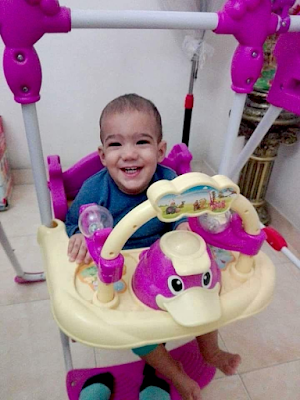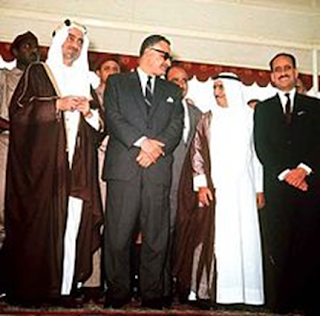Egyptian Authorities Take Adopted Child Away from Coptic Christian Family.
 At the tender age of eight, a child by the name of Mikhail was taken away from his adoptive parents and taken to a state home. The details of this case go back to the year 2016 when Mikhail was a newborn infant and found abandoned at the "Great Martyr Mar Girgis Church in Abu Zaabal." Fr. Morcos Girgis found him wrapped in a blanket in front of his office door with a picture of the Virgin Mary attached to him. Mikhail was in poor health and quickly taken to Dr. Ramses Naguib Boulos, who ran the Mar Girgis clinic next to the church. After bringing the child back to health, Dr. Boulos and his wife decided to adopt him. Tragically, Mikhail was taken away from his adoptive family eight years later as they proclaimed him to be a Muslim and therefore must be raised as a Muslim in a government care home. Dr. Boulos and his wife filed suit against this action and have been fighting for over 18 months to get their adopted child back. Tragically, the Administrative Court of Justice ruled that they had no jurisdiction in this matter on Jan. 23rd of this year, forcing Dr. Boulos to take the case to the Supreme Administrative Court. However, while all of this this is being settled, Mikhail has been forced to live in a government center away from his adoptive family.
At the tender age of eight, a child by the name of Mikhail was taken away from his adoptive parents and taken to a state home. The details of this case go back to the year 2016 when Mikhail was a newborn infant and found abandoned at the "Great Martyr Mar Girgis Church in Abu Zaabal." Fr. Morcos Girgis found him wrapped in a blanket in front of his office door with a picture of the Virgin Mary attached to him. Mikhail was in poor health and quickly taken to Dr. Ramses Naguib Boulos, who ran the Mar Girgis clinic next to the church. After bringing the child back to health, Dr. Boulos and his wife decided to adopt him. Tragically, Mikhail was taken away from his adoptive family eight years later as they proclaimed him to be a Muslim and therefore must be raised as a Muslim in a government care home. Dr. Boulos and his wife filed suit against this action and have been fighting for over 18 months to get their adopted child back. Tragically, the Administrative Court of Justice ruled that they had no jurisdiction in this matter on Jan. 23rd of this year, forcing Dr. Boulos to take the case to the Supreme Administrative Court. However, while all of this this is being settled, Mikhail has been forced to live in a government center away from his adoptive family. The view of the Egyptian Court and Authorities is that it assumes that all children of unknown parentage must follow the "Born on the Religion of Innate Nature." This means, in the states view, that all children born of unknown parentage are to automatically considered to be born of the dominant religion of the state, which is in the case of Egypt, the Islamic religion. Under Islamic doctrine, Christian parents cannot adopt Muslim children, which means children like Mikhail must be raised in accordance to Islamic doctrine in an Islamic household or facility, and it makes no difference if the child was found abandoned by Christian inside of a Christian house of worship.
Tragically, these types of cases are not unheard of in Egypt. In the year 2018 a newborn baby was found in the bathroom of St. Mary's Church in Az Zawiya Al Hamra. Unsure of what to do, the priest decided to give the baby to a middle-aged couple Amal Mikhail and her husband Farouk Bolous, who wanted children of their own, but were unable to conceive. The couple named the baby Shenouda and raised raised him for over four years. The family decided to obtain a birth certificate for Shenouda as under Islamic jurisprudence, which dominates Egypt, orphaned children can be taken in by families, but they are to be considered "sponsored," and not "adopted" as we would recognize it here in the West. Tragically, the authorities found out and at the age of four, took Shenouda away from his family.
The Egyptian prosecutor ruled that since Shenouda's parentage couldn't ascertained, he was to automatically be considered Muslim as per: "Born on the Religion of Innate Nature." Under Sharia, all human beings are born Muslim by nature, with some parents making theirs Christians or Jews. Shenouda was taken away to an Islamic orphanage and given a new birth certificate naming him Youssef Abdullah Mohamed. For seven months the family fought to get Shenouda back, but during that time they were forbidden to see him. Unable to get Shenouda back, the family turned to the media, and as his case went public, both the Coptic community and many Egyptian Muslims raised their voices and said that Shenouda should go back to his adoptive family as he had a much better life with them then in the orphanage. However, some Muslims and Islamic clerics continued to insist that Shenouda was still a Muslim, and the fact that he was found in a church was irrelevant, and he should therefore be raised as a Muslim. Some even pushed his adoptive parents to convert to Islam, decreeing that this would resolve the whole issue.
Shenouda's case was taken to court in March of 2023 where, like in Mikhail's case, they ruled that they had no jurisdiction on the matter, which continued to force Shenouda to remain at the orphanage and continued to forbid his parents to see him. However, at this point, the state's Islamic religious authorities ruled that because Shenouda was found inside a church, he is considered to be Christian and declared that the adoption was valid. This finally forced the Egyptian prosecutor to allow Shenouda to return to his adoptive parents. Though the family finally got Shenouda back, the fact that they had to go through all of this was despicable. It also serve to illustrate that despite the laws that are written in Egypt's books, Sharia Law always takes precedent, even if it's not the official state law. For instance, Egyptian Law techichally guarantees freedom of belief for everyone and permits their citizens over the age of 18 to change their religion if they wish to do so, but in truth, it is impossible for a Muslim to legally convert to Christianity in Egypt. Individuals who have tried to go to state offices and official change their religious affiliation from Muslim to Christian have been subjected to arrest and prosecution, whereas Christians in Egypt can convert to Islam without hinderance. If this practice is not changed, we are sure to hear about more cases in the future that are similar to those of Mikhail and Shenouda.
Sources:
El Masry, Amira. "Child Mikhail, and the 'Innate Islam' Proclaimed by the Egyptian State." Coptic Solidarity. Feb. 01, 2024. Accessed from https://www.copticsolidarity.org/2024/02/01/child-mikhail-and-the-innate-islam-proclaimed-by-the-egyptian-state/?eType=EmailBlastContent&eId=459a4ab6-aa3f-466e-8e9d-c4966780bb72.
Tadros, Samuel. "His Name is Shenouda." Compact. May 29, 2023. Accessed from https://compactmag.com/article/his-name-is-shenouda.




Comments
Post a Comment